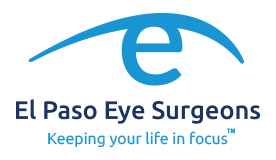Nutrition, Lifestyle, and Glaucoma
Nutrition and lifestyle can have an effect on the development and progression of glaucoma by helping control intraocular pressure (IOP) and maintaining overall eye health, making diet and exercise important contributors to preserving vision. Because glaucoma is not a curable eye disease and any visual damage caused by glaucoma cannot be regained, prevention for individuals at risk and slowing progression for patients diagnosed with glaucoma are vital components of glaucoma treatment.
While eating nutrient-rich foods and leading an active lifestyle are commonly accepted ways to remain healthy, research shows that specific nutrients are more effective than others at protecting the eyes and reducing the risk of ocular diseases, such as glaucoma. Our glaucoma specialist eye doctors (ophthalmologists) at El Paso Eye Surgeons encourage you to maintain a healthy lifestyle if you are diagnosed with glaucoma.
Nutrition, Lifestyle, and Glaucoma
Nutrition and lifestyle can have an effect on the development and progression of glaucoma by helping control intraocular pressure (IOP) and maintaining overall eye health, making diet and exercise important contributors to preserving vision. Because glaucoma is not a curable eye disease and any visual damage caused by glaucoma cannot be regained, prevention for individuals at risk and slowing progression for patients diagnosed with glaucoma are vital components of glaucoma treatment.
While eating nutrient-rich foods and leading an active lifestyle are commonly accepted ways to remain healthy, research shows that specific nutrients are more effective than others at protecting the eyes and reducing the risk of ocular diseases, such as glaucoma. Our glaucoma specialist eye doctors (ophthalmologists) at El Paso Eye Surgeons encourage you to maintain a healthy lifestyle if you are diagnosed with glaucoma.
Nutrition, Lifestyle, and Glaucoma
Nutrition and lifestyle can have an effect on the development and progression of glaucoma by helping control intraocular pressure (IOP) and maintaining overall eye health, making diet and exercise important contributors to preserving vision. Because glaucoma is not a curable eye disease and any visual damage caused by glaucoma cannot be regained, prevention for individuals at risk and slowing progression for patients diagnosed with glaucoma are vital components of glaucoma treatment.
While eating nutrient-rich foods and leading an active lifestyle are commonly accepted ways to remain healthy, research shows that specific nutrients are more effective than others at protecting the eyes and reducing the risk of ocular diseases, such as glaucoma. Our glaucoma specialist eye doctors (ophthalmologists) at El Paso Eye Surgeons encourage you to maintain a healthy lifestyle if you are diagnosed with glaucoma.
Nutrition’s Effect on Glaucoma
Healthy eating is not a substitute for glaucoma treatment, however, good nutrition can play a role in glaucoma prevention, as well as helping maintain eyesight in glaucoma patients. Foods that can provide protection for vision include those containing high levels of antioxidants, vitamins A (especially retinol), C, and E, and zinc.
Lutein and zeaxanthin, nutrients found naturally in the eyes, are believed to be especially beneficial to eye health and can reduce the risk factors for glaucoma. Spinach and other leafy green vegetables contain high amounts of these antioxidants. A good rule of thumb to obtain the proper nutrients for ocular health is to eat colorfully (especially green and orange).
Green foods beneficial for eye health:
- Brussel sprouts and broccoli
- Green peas, beans, peppers, and olives
- Cucumbers
- Celery
- Avocadoes
Orange and yellow foods that can help maintain vision are:
- Citrus fruits
- Egg yolks
- Carrots
- Sweet potatoes
- Cantaloupe
- Apricots
- Cheese
- Pumpkin
- Summer squash
- Corn
- Papaya
Other foods that promote healthy eyes:
- Seafood, nuts, and flaxseed (due to the omega-3 fatty acids)
- Berries
- Tomatoes (or products containing lycopene)
- Cauliflower
- Dark chocolate
- Whole grains and cereals
- Milk
- Lean meats
- Green tea and coffee (unsweetened and in moderation if caffeinated)
Additional Nutritional Information
Foods to Avoid with Glaucoma
For glaucoma patients, what you don’t eat can be just as important to your eye health as the foods you do consume. Maintaining proper eye pressure is vital for those with glaucoma, so avoiding foods with high amounts of caffeine is recommended. Coffee and teas that contain beneficial antioxidants should be consumed in moderation as not to increase blood pressure which can raise IOP.
Salt consumption should be kept to a minimum to maintain blood pressure, as well. Drinking large amounts of liquid in a short period can also raise pressure levels, so sipping small amounts throughout the day as a precautionary measure is advised.
Nutritional Supplements for Glaucoma Patients
Because the increase in food refinement has resulted in many important nutrients being processed out, doctors often recommend supplementing the diet with vitamins, minerals, or herbs that may be lacking in daily food consumption.
Glaucoma patients should always consult their ophthalmologist before beginning any supplement regiment since it is possible to take in too many vitamins and minerals. Consuming too much of certain herbs, vitamins or minerals can result in serious health problems. Some supplements taken in excess can actually damage vision or increase the risk of bleeding should the patient undergo glaucoma surgery.
While eating healthfully is the safest way to get proper nutrition, your ophthalmologist can advise you if you need additional supplements in your diet to help maintain eye health.
Lifestyle Recommendations
For patients diagnosed with glaucoma, the most important lifestyle change is the compliance with glaucoma treatment. Most glaucoma treatments involve instilling glaucoma eye drops, so understanding how to use eye drops properly is imperative. While not particularly difficult, adhering to your medication schedule is necessary to successful glaucoma treatment.
Other lifestyle recommendations to maintain ocular health include:
- Safe exercise: Studies show that moderate exercise can reduce several risk factors for glaucoma. Your exercise and glaucoma should both be monitored by your doctor.
- Elevate the head while sleeping: A 20-degree incline with a wedge pillow can reduce intraocular pressure.
- Stress relief: Use of relaxation techniques or meditation can help patients cope with stress which can be a trigger for acute angle-closure glaucoma.
- Regular ophthalmologic check-ups: Since glaucoma typically has no warning signs, having an annual comprehensive eye exam will allow for early detection of glaucoma (especially if you are at high risk, such as family history). If you are diagnosed with glaucoma, your ophthalmologist should monitor your condition regularly.
While no diet or lifestyle change can replace glaucoma treatment, evidence suggests that both healthy eating and moderate exercise can contribute to glaucoma prevention and overall good ocular health.
Contact Our Office to
Learn More
Learn More

